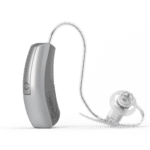Sometimes it seems like your teenager has just stopped listening to you. Or, maybe they have selective hearing. You may chalk it up to them just “being teenagers,” but with recent studies on how hearing loss affects younger people, it is important to make sure that the young people in your life understand the long-term effects of hearing loss.
Various studies on Millennials have shown that there is a larger number of young people experiencing hearing loss in the late-20s than with counterparts in previous generations. With the advent of portable, personal electronic devices and those small, convenient earbud headphones, most young people are plugged in and tuning out the world around them. If you’ve told your teenager to turn down the volume or to take a break from the headphones, you’re on the right track.
Hearing is taken for granted, and noise-induced hearing loss is 100% preventable. With young people, there is still time to take measures to protect their hearing. If you are concerned with the hearing health of the teens in your life, here are some easy facts to share with them.
Hearing loss is irreversible.
Once your inner ear cells are damaged, they do not regenerate. There is no cure for hearing loss, but there are treatments in the form of instruments such as hearing aids.Noise-induced hearing loss is one of the most common forms.
Noise-induced hearing loss is caused by exposure to loud sounds over long periods of time. In certain occupations such as construction, factory work, and the music industry, noise-induced hearing loss is prevalent – but it can also occur due to daily exposure to unsafe volumes, such as with headphones or earbuds. The thing is, noise-induced hearing loss is 100% preventable – unlike other forms of hearing loss, such as age-related hearing loss (presbycusis).Earbuds increase the risk of hearing loss.
Sure, they’re convenient and allow for mobility, but earbuds also heighten the risk of damage to your hearing. They offer almost no noise-cancellation, which means you’re listening to music and media at higher volumes than you would with over-the-ear headphones. Even with noise-canceling earbuds, their position in your ear canals, with close proximity to your ear drums, are comparable in volume to listening to power tools in a coal mine.Unplug
. If you’re in a noisy environment, whether it’s on a plane or on a subway train, you may have difficulty hearing through your earbuds or headphones – unless they offer noise-cancellation. Rather than cranking up the volume – which compounds the level of damaging decibels – consider unplugging and waiting until you’re in a different environment to listen to your music. In general, it is good to unplug and give your ears a rest.Follow the 60-60 rule.
Whether you’re listening over speakers or through headphones, hearing specialists recommend following the 60-60 rule: play the volume at 60% for no more than 60 minutes at a time. Again, it is important to give yourself a “noise diet” – take breaks from loud sounds frequently.Use technology to your advantage
. Most devices have been designed to play at volumes much louder than recommended for hearing health. Apps have been developed to manage volume levels on your devices; consider downloading one, setting safe volume levels, and protect your hearing!Hearing loss is linked with other health problems
. Individuals who experience hearing loss are at higher risk of developing depression, anxiety, and higher levels of stress. Researchers have recently found a potential link between hearing loss and dementia. The auditory system also controls your balance; individuals with hearing loss are at higher risk for falls and accidents.Consider customized ear protection
. Volume levels at concerts and music festivals are extremely loud and increase the risk for hearing loss. If you’re a musician, your consistent exposure to high volumes from venue speakers endangers your hearing health. Customized ear plugs are molded to fit your ears, protecting you from dangerous decibel levels, while still enabling you to hear the sounds you want.Take a hearing test
. A comprehensive and conclusive hearing test is conducted by a hearing specialist. If you live in Florida, we offer free hearing tests at our various Ear to Hear locations. Incorporate an annual hearing test into your health plan.As a generation, our hearing is getting worse.
For individuals between the ages of 12 and 35, researchers found that 30% are more likely to experience hearing loss than their counterparts in the 1980s and 1990s. The World Health Organization has also found that 1.1 billion teenagers globally are at risk for hearing loss.


